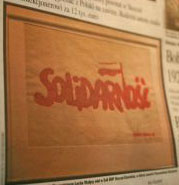 On this day 30 years ago, the Polish communist government banned all trade unions including Solidarność, known to the English-speaking world as Solidarity. During the 1970s the government had raised food prices, leading to protests and government crackdowns on dissent. An electrician named Lech Wałęsa became a trade union activist and, after several run-ins with the government, was one of the negotiators who persuaded the government to allow formation of an independent trade union, Solidarity, in August 1980.
On this day 30 years ago, the Polish communist government banned all trade unions including Solidarność, known to the English-speaking world as Solidarity. During the 1970s the government had raised food prices, leading to protests and government crackdowns on dissent. An electrician named Lech Wałęsa became a trade union activist and, after several run-ins with the government, was one of the negotiators who persuaded the government to allow formation of an independent trade union, Solidarity, in August 1980.
The new union grew rapidly and was registered in November 1980. It became a broad anti-Soviet social movement with strong support from the Catholic Church, using non-violent civil resistance. By the time of the first national congress, at which Lech Wałęsa was elected president of the organisation, the union had around 10 million members, being about one third of all working-age people in Poland.
Martial law was declared in December 1981, and the government tried to destroy Solidarity through repression, banning, and imprisonment of the organisation’s leaders, but eventually the government was forced to negotiate with the union, leading to partially free elections in 1989, after which Solidarity led a coalition government. Lech Wałęsa was awarded the Nobel Peace Prize in 1983 and was president of Poland from 1990 to 1995.